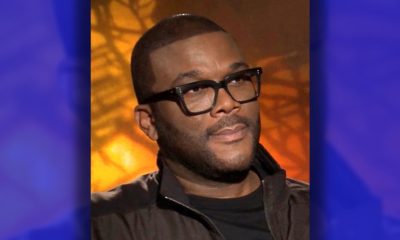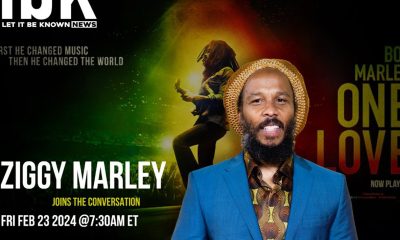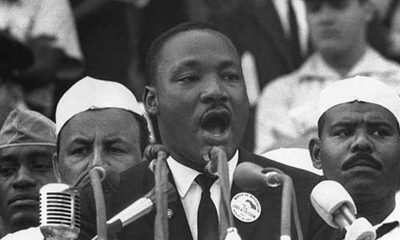#NNPA BlackPress
Historic Noir Coffee Group: Three Men and a Dream
NNPA NEWSWIRE — Sixty-four percent of Americans have at least one cup of coffee a day. Of those surveyed (3000 people), 79 percent said they made coffee at home and 36 percent said they drink coffee at retail locations. According to Food & Wine, Americans spend more money on coffee each year than any other country. The average American spends $1,110 on coffee each year contributing to a $20 billion-dollar industry here in the states.
By Nsenga K. Burton, Ph.D. , NNPA Newswire Culture and Entertainment Editor
Historic Noir Coffee Group is coming to a grocery store near you. The brain child of Ricardo Richardson and his collaborators Deron Moreman and Christopher Brown, the three childhood friends got together to form The Historic Noir Coffee Group, LLC and launch Historic Noir Coffee Group in flavors that reflect the neighborhoods they grew up in as children in Atlanta.

Childhood Friends and Historic Noir Coffee Group owners Christopher Brown (l), Deron Moreman (c) and Ricardo Richardson (r) are interviewed by CBS 46’s Trayce Hutchinson. (Photo Credit: Christopher Brown)
There is Fourth Ward blend where Ricardo, the founder and CEO of the company, grew up, West End blend where Deron, the Vice-President of Sales, grew up and the Decatur blend, where Christopher Brown, President of Marketing and Distribution, grew up.
Brown explains Richardson introduced the idea to Moreman and Brown, initially wanting to supply high quality coffee at a reasonable price to various business and government entities. Working with a supplier in Senegal and wanting to grow the business and make a mark in an industry where there isn’t a lot of minority representation, Richardson approached his childhood friends with his idea. Thinking about his idea, the market and timing, Moreman and Brown signed on and the rest is history, or Historic Noir Coffee, LLC if you will.
If you’re wondering, “Why coffee?” of all of the businesses they could have started, Brown is very clear. “Gold, oil and coffee are at the top of the stock market at any given time,” says Brown. “Coffee is so profitable McDonald’s built a number of offerings around it and Dunkin Donuts changed it’s name to focus on coffee because it has a higher profit margin,” he adds.
Coffee is great business according to a 2018 report released by the National Coffee Association, which provides research data on U.S. coffee consumption through its annual National Coffee Drinking Trends (NCDT) survey.
Sixty-four percent of Americans have at least one cup of coffee a day. Of those surveyed (3000 people), 79 percent said they made coffee at home and 36 percent said they drink coffee at retail locations. According to Food & Wine, Americans spend more money on coffee each year than any other country. The average American spends $1,110 on coffee each year contributing to a $20 billion-dollar industry here in the states.
Even though coffee is a billion-dollar industry in the United States and is literally the crown jewel of many African, Caribbean and South American countries (Ethiopia, Jamaica, Brazil), very few African-Americans participate in supplying and distributing coffee.
There are a number of reasons for this problem, from issues around consumption (coffee will make you black) to challenges around access to resources stemming from slavery and hundreds of years of being economically disenfranchised.
In the article, “Strong Black Coffee: Why Aren’t African-Americans More Prominent in the Coffee Industry,” Phyllis Johnson, President of BD imports discusses the myriad of reasons you don’t find many black people in the coffee industry.

Historic Noir Coffee Group Blends (Photo Credit: Christopher Brown)
African-Americans choose coffee less due to stigma’s surrounding coffee’s impact on other health issues. Despite the fact that coffee is shown to have a positive impact on diseases like cancer, diabetes, stroke and heart disease, many still believe coffee is bad for your health.
Johnson states, “The NCDT consistently shows that, in comparison to other ethnic groups, African-Americans are less likely to choose coffee as a preferred beverage.” She believes there is a direct correlation between less consumption and less representation in the industry in other areas like distribution.
Johnson adds, “The absence of African-Americans attending coffee industry conferences, serving on boards and working in coffee in general goes hand in hand with lower levels of consumption. While targeted marketing programs may improve consumption, I believe employment and education will provide a greater return on investment. Greater engagement from African-Americans throughout the industry will provide more ideas and new ways to overcome challenges.”
Johnson’s research and observations about the coffee industry speak to Richardson’s desire to enter an industry that was viable and needed African-American suppliers and distributors. As luck would have it, a streak of seemingly bad luck yet great timing led the friends to take a shot at this opportunity.
In 2008, Ricardo and Deron had been laid off from their prior places of employment. Christopher took an early retirement and was involved in several entrepreneurial pursuits. After eight years of George W. Bush’s economic policies, the U.S. economy was depressed. Despite these precarious times, the three friends decided to take a shot, building on their faith (they grew up going to church together), ability to work as a team (they grew up playing sports together) and prior professional experiences.
Deron had previously worked for a company that sold water and coffee. He had the knowledge and organizational skills. Christopher had a pilot’s license and retired from working as an airplane mechanic, so he knew the travel industry. Ricardo had the vision and foundation in place. Eleven years later, the friends have built a supplier and distribution coffee business that is influenced, informed and run by people of African descent, which is where coffee originated. Talk about a full-circle moment on multiple fronts.
Brown says their success was in the cards. “We were crazy enough to believe we could do it. We saw the vision knew it would work,” he adds. They set off on their journey, educating themselves along the way and making sure they were building a viable business. “One of the most important things to us was taking the time to get it right,” says Brown. “We took time to get infrastructure, licensing, insurance – pretty much everything that was needed to build a viable company and made sure it was in place before we really got into supply and distribution.”
They tested theories and strategies and processes, analyzing, making necessary changes and continuing to move forward. When listening to Brown speak about the different types of beans and how they work together, one might think he’s a scientist with his vivid descriptions and ability to communicate complex information in an accessible way.
Historic Noir Coffee is now sold under different labels (Rosie’s Coffee) and can be found in grocery store chains like Sprouts and their online business is robust, with customers all over the world.
Brown is proud of their success and says one of their company goals is to give back to the community, so they do a lot of work with various charitable organizations. In fact, recognizing that most coffee is sourced and created from the labor of people of African descent, they developed the following mission:
Respect the coffee grower community, the environment and the customer. Conducting our business with honest practices and in an ethical manner is paramount.
The mission of Historic Noir Coffee Group, LLC dovetails with their vision, which is to develop strong relationships with their suppliers and to partner with the top importers and roasters based in the U.S., therefore providing the highest quality coffee products. To ensure this level of integrity, they made it policy to partner with “Fair Trade” coffee importers who are committed to respecting humanity and the environment.
Historic Noir Coffee Group, LLC is a company created and run by three black childhood friends from Atlanta, who care about the local and global community and ensuring that African-Americans get an opportunity to participate in a coffee industry that is truly a natural fit. Later this year, their coffee, which is currently whole bean, will be available in K-Pods and ground coffee.
When asked what’s next, Brown simply states, “Making sure we maintain the quality of our product, operate with high professional and ethical standards, and continue to grow while helping our community.”
This article was written by Nsenga K. Burton, Ph.D., entertainment and culture editor for Black Press USA. She is also founder & editor-in-chief of the award-winning news blog The Burton Wire which covers news of the African Diaspora. Follow her on Twitter @Ntellectual.
#NNPA BlackPress
Beloved Actor and Activist Louis Cameron Gossett Jr. Dies at 87
NNPA NEWSWIRE — Louis Gossett Jr., the groundbreaking actor whose career spanned over five decades and who became the first Black actor to win an Academy Award as Best Supporting Actor for his memorable role in “An Officer and a Gentleman,” has died. Gossett, who was born on May 27, 1936, in Brooklyn, N.Y., was 87. Recognized early on for his resilience and nearly unmatched determination, Gossett arrived in Los Angeles in 1967 after a stint on Broadway.
The post Beloved Actor and Activist Louis Cameron Gossett Jr. Dies at 87 first appeared on BlackPressUSA.

By Stacy M. Brown
NNPA Newswire Senior National Correspondent
@StacyBrownMedia
Louis Gossett Jr., the groundbreaking actor whose career spanned over five decades and who became the first Black actor to win an Academy Award as Best Supporting Actor for his memorable role in “An Officer and a Gentleman,” has died. Gossett, who was born on May 27, 1936, in Brooklyn, N.Y., was 87. Recognized early on for his resilience and nearly unmatched determination, Gossett arrived in Los Angeles in 1967 after a stint on Broadway.
He sometimes spoke of being pulled over by law enforcement en route to Beverly Hills, once being handcuffed to a tree, which he remembered as a jarring introduction to the racial tensions of Hollywood. In his memoir “An Actor and a Gentleman,” Gossett recounted the ordeal, noting the challenges faced by Black artists in the industry. Despite the hurdles, Gossett’s talent shone brightly, earning him acclaim in groundbreaking productions such as “A Raisin in the Sun” alongside Sidney Poitier. His Emmy-winning portrayal of Fiddler in “Roots” solidified his status as a trailblazer, navigating a landscape fraught with racial prejudice.
According to the HistoryMakers, which interviewed him in 2005, Gossett’s journey into the limelight began during his formative years at PS 135 and Mark Twain Junior High School, where he demonstrated early leadership as the student body president. His passion for the arts blossomed when he starred in a “You Can’t Take It With You” production at Abraham Lincoln High School, catching the attention of talent scouts who propelled him onto Broadway’s stage in “Take A Giant Step.” His stellar performance earned him the prestigious Donaldson Award for Best Newcomer to Theatre in 1952. Though initially drawn to sports, Gossett’s towering 6’4” frame and athletic prowess led him to receive a basketball scholarship at New York University. Despite being drafted by the New York Knicks in 1958, Gossett pursued his love for acting, honing his craft at The Actors Studio under the tutelage of luminaries like John Sticks and Peggy Fury.
In 1961, Gossett’s talent caught the eye of Broadway directors, leading to roles in acclaimed productions such as “Raisin in the Sun” and “The Blacks,” alongside legends like James Earl Jones, Cicely Tyson, Roscoe Lee Brown, and Maya Angelou. Transitioning seamlessly to television, Gossett graced small screens with appearances in notable shows like “The Bush Baby” and “Companions in Nightmare.” Gossett’s silver screen breakthrough came with his role in “The Landlord,” paving the way for a prolific filmography that spanned over 50 movies and hundreds of television shows. From “Skin Game” to “Lackawanna Blues,” Gossett captivated audiences with his commanding presence and versatile performances.
However, his portrayal of “Fiddler” in Alex Haley’s groundbreaking miniseries “Roots” earned Gossett critical acclaim, including an Emmy Award. The HistoryMakers noted that his golden touch extended to the big screen, where his role as Sergeant Emil Foley in “An Officer and a Gentleman” earned him an Academy Award for Best Supporting Actor, making him a trailblazer in Hollywood history.
Beyond the glitz and glamour of Hollywood, Gossett was deeply committed to community activism. In 1964, he co-founded a theater group for troubled youth alongside James Earl Jones and Paul Sorvino, setting the stage for his lifelong dedication to mentoring and inspiring the next generation. Gossett’s tireless advocacy for racial equality culminated in the establishment of Eracism, a nonprofit organization dedicated to combating racism both domestically and abroad. Throughout his illustrious career, Gossett remained a beacon of strength and resilience, using his platform to uplift marginalized voices and champion social change. Gossett is survived by his children, Satie and Sharron.
The post Beloved Actor and Activist Louis Cameron Gossett Jr. Dies at 87 first appeared on BlackPressUSA.
#NNPA BlackPress
COMMENTARY: D.C. Crime Bill Fails to Address Root Causes of Violence and Incarceration
WASHINGTON INFORMER — The D.C. crime bill and so many others like it are reminiscent of the ‘94 crime bill, which produced new and harsher criminal sentences, helped deploy thousands of police and surveilling methods in Black and brown communities, and incentivized more states to build prisons through a massive infusion of federal funding. While it is not at the root of mass incarceration, it significantly accelerated it, forcing a generation of Black and brown families into a never-ending cycle of state-sanctioned violence and incarceration.
The post COMMENTARY: D.C. Crime Bill Fails to Address Root Causes of Violence and Incarceration first appeared on BlackPressUSA.

By Kaili Moss and Jillian Burford | Washington Informer
Mayor Bowser has signed the “Secure DC” omnibus bill passed by the D.C. Council last month. But we already know that this bill will be disastrous for all of D.C., especially for Black and brown residents.
While proponents claim that this legislation “will make D.C. residents safer and more secure,” it actually does nothing to address the root of the harm in the first place and instead maintains a cycle of violence, poverty, and broken community ties. The omnibus bill calls for increased surveillance, drug-free zones, and will expand pre-trial detention that will incarcerate people at a significantly higher rate and for an indeterminate amount of time before they are even tried. This bill will roll back decades of nationwide policy reform efforts and initiatives to keep our communities safe and whole, which is completely contradictory to what the “Secure” D.C. bill claims it will do.
What is unfolding in Washington, D.C., is part of a dangerous national trend. We have seen a resurrection of bad crime bills in several jurisdictions across the country — a phenomenon policy experts have named “zombie laws,” which are ineffective, costly, dangerous for communities of color and, most importantly, will not create public safety. Throwing more money into policing while failing to fund preventative measures does not keep us safe.
The D.C. crime bill and so many others like it are reminiscent of the ‘94 crime bill, which produced new and harsher criminal sentences, helped deploy thousands of police and surveilling methods in Black and brown communities, and incentivized more states to build prisons through a massive infusion of federal funding. While it is not at the root of mass incarceration, it significantly accelerated it, forcing a generation of Black and brown families into a never-ending cycle of state-sanctioned violence and incarceration. Thirty years later, despite spending billions each year to enforce these policies with many of these provisions remaining in effect, it has done very little to create long-term preventative solutions. Instead, it placed a permanent moving target on the backs of Black people, and the D.C. crime bill will do the same.
The bill calls for more pretrial detention. When our loved ones are held on pretrial detention, they are held on the presumption of guilt for an indeterminate amount of time before ever seeing a judge, which can destabilize people and their families. According to experts at the Malcolm Weimer Center for Social Policy at Harvard University, just one day in jail can have “devastating consequences.” On any given day, approximately 750,000 people are held in jails across the nation — a number that beats our nation’s capital population by about 100,000. Once detained, people run the risk of losing wages, jobs, housing, mental and health treatments, and time with their families. Studies show that pretrial detention of even a couple of days makes it more likely for that person to be rearrested.
The bill also endangers people by continuing a misguided and dangerous War on Drugs, which will not get drugs off the street, nor will it deter drug use and subsequent substance use disorders (SUDs). Drug policies are a matter of public health and should be treated as such. Many states such as Alabama, Iowa and Wisconsin are treating the current fentanyl crisis as “Crack 2.0,” reintroducing a litany of failed policies that have sent millions to jails and prisons instead of prioritizing harm reduction. Instead, we propose a simple solution: listen to members of the affected communities. Through the Decrim Poverty D.C. Coalition, community members, policy experts and other stakeholders formed a campaign to decriminalize drugs and propose comprehensive legislation to do so.
While there are many concerning provisions within the omnibus bill, car chases pose a direct physical threat to our community members. In July 2023, NBC4 reported that the D.C. Council approved emergency legislation that gave MPD officers the ability to engage in vehicular pursuits with so-called “limited circumstances.” Sgt. Val Barnes, the head of MPD’s carjacking task force, even expressed concern months before the decision, saying, “The department has a pretty strict no-chase policy, and obviously for an urban setting and a major metropolitan city, that’s understandable.” If our law enforcement officers themselves are operating with more concern than our elected officials, what does it say about the omnibus bill’s purported intention to keep us safe?
And what does it mean when the risk of bodily harm is posed by the pursuit itself? On Saturday, Feb. 10, an Eckington resident had a near-miss as a stolen car barreled towards her and her dog on the sidewalk with an MPD officer in pursuit. What responsibility does the city hold if this bystander was hit? What does restitution look like? Why are our elected officials pushing for MPD officers to contradict their own policies?
Just a few summers ago during the uprisings of 2020, we saw a shift in public perspectives on policing and led to legislation aimed at limiting police power after the highly-publicized murders of loved ones Breonna Taylor and George Floyd — both victims of War on Drugs policing and the powers gained from the ’94 crime bill. And yet here we are. These measures do not keep us safe and further endanger the health of our communities. Studies show that communities that focus on harm reduction and improving material conditions have a greater impact on public safety and community health. What’s missing in mainstream conversations about violent crime is the violence that stems from state institutions and structures that perpetuate racial and class inequality. The people of D.C. deserve to feel safe, and that includes feeling safe from the harms enacted by the police.
Kaili Moss is a staff attorney at Advancement Project, a national racial justice and legal organization, and Jillian Burford is a policy organizer at Harriet’s Wildest Dreams.
The post COMMENTARY: D.C. Crime Bill Fails to Address Root Causes of Violence and Incarceration first appeared on BlackPressUSA.
#NNPA BlackPress
Mayor, City Council President React to May 31 Closing of Birmingham-Southern College
THE BIRMINGHAM TIMES — “This is a tragic day for the college, our students, our employees, and our alumni, and an outcome so many have worked tirelessly to prevent,” Rev. Keith Thompson, chairman of the BSC Board of Trustees said in an announcement to alumni. “We understand the devastating impact this has on each of you, and we will now direct our efforts toward ensuring the smoothest possible transition for everyone involved.”
The post Mayor, City Council President React to May 31 Closing of Birmingham-Southern College first appeared on BlackPressUSA.

By Barnett Wright | The Birmingham Times
Birmingham-Southern College will close on May 31, after more than a century as one of the city’s most respected institutions.
“This is a tragic day for the college, our students, our employees, and our alumni, and an outcome so many have worked tirelessly to prevent,” Rev. Keith Thompson, chairman of the BSC Board of Trustees said in an announcement to alumni. “We understand the devastating impact this has on each of you, and we will now direct our efforts toward ensuring the smoothest possible transition for everyone involved.”
There are approximately 700 students enrolled at BSC this semester.
“Word of the decision to close Birmingham Southern College is disappointing and heartbreaking to all of us who recognize it as a stalwart of our community,” Birmingham Mayor Randall Woodfin said in a statement. “I’ve stood alongside members of our City Council to protect this institution and its proud legacy of shaping leaders. It’s frustrating that those values were not shared by lawmakers in Montgomery.”
Birmingham City Council President Darrell O’Quinn said news of the closing was “devastating” on multiple levels.
“This is devastating for the students, faculty members, families and everyone affiliated with this historic institution of higher learning,” he said. “It’s also profoundly distressing for the surrounding community, who will now be living in close proximity to an empty college campus. As we’ve seen with other institutions that have shuttered their doors, we will be entering a difficult chapter following this unfortunate development … We’re approaching this with resilience and a sense of hope that something positive can eventually come from this troubling chapter.”
The school first started as the merger of Southern University and Birmingham College in 1918.
The announcement comes over a year after BSC officials admitted the institution was $38 million in debt. Looking to the Alabama Legislature for help, BSC did not receive any assistance.
This past legislative session, Sen. Jabo Waggoner sponsored a bill to extend a loan to BSC. However, the bill subsequently died on the floor.
Notable BSC alumni include former New York Times editor-in-chief Howell Raines, former U.S. Sen. Howell Heflin and former Alabama Supreme Court Chief Justice Perry O. Hooper Sr.
This story will be updated.
The post Mayor, City Council President React to May 31 Closing of Birmingham-Southern College first appeared on BlackPressUSA.
-

 Activism4 weeks ago
Activism4 weeks agoOakland Post: Week of March 20 – 26, 2024
-

 #NNPA BlackPress3 weeks ago
#NNPA BlackPress3 weeks agoCOMMENTARY: D.C. Crime Bill Fails to Address Root Causes of Violence and Incarceration
-

 #NNPA BlackPress3 weeks ago
#NNPA BlackPress3 weeks agoMayor, City Council President React to May 31 Closing of Birmingham-Southern College
-

 #NNPA BlackPress3 weeks ago
#NNPA BlackPress3 weeks agoFrom Raids to Revelations: The Dark Turn in Sean ‘Diddy’ Combs’ Saga
-

 #NNPA BlackPress3 weeks ago
#NNPA BlackPress3 weeks agoCOMMENTARY: Lady Day and The Lights!
-

 #NNPA BlackPress3 weeks ago
#NNPA BlackPress3 weeks agoBaltimore Key Bridge Catastrophe: A City’s Heartbreak and a Nation’s Alarm
-

 #NNPA BlackPress3 weeks ago
#NNPA BlackPress3 weeks agoBaltimore’s Key Bridge Struck by Ship, Collapses into Water
-

 Activism3 weeks ago
Activism3 weeks agoOakland Post: Week of March 27 – April 2, 2024




















































2 Comments